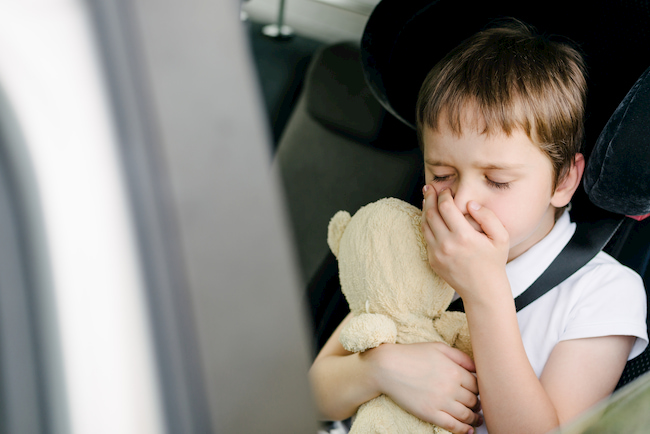We’ve all been there — riding in a car or on an airplane when, all of a sudden, nausea hits. Motion sickness is all too common, but there are some steps you can take to make your next road trip with the kids a little less painful.
Motion sickness has been occurring for as long as we’ve been in motion. It can strike without warning and is exactly like it sounds, it’s sickness that’s triggered by motion.
While it can occur in people of all ages, it’s particularly common among kids, pregnant women and those who are taking certain kinds of medication. Any mom who’s traveled with a child or two knows this to be true!
Let’s take a deeper dive into motion sickness and what you can do if your little ones are affected.
Defining motion sickness
Motion sickness can seemingly appear out of nowhere, causing anything from a slight queasy feeling to vomiting, dizziness and a cold sweat.
But how does it work exactly?
Well, your brain typically knows that things around you are moving based on signals from the ears, eyes, muscles and joints. If those body parts are sending signals that don’t match up, motion sickness is the result.
That means that if, for example, your child is playing on a tablet while you’re driving down the road, his eyes might not sense motion but his inner ear would. And boom: motion sickness.
Tips to fend off motion sickness
So, now that we’ve established what causes motion sickness, how can you prevent it from happening? While there’s no 100 percent foolproof way of preventing it, there are steps you can take to lessen the risk:
- Eat before hitting the road. But watch what you eat! You want your little one to have a small amount of food on the stomach, but not an extremely heavy or greasy meal. While it might seem logical that a child prone to motion sickness should have an empty stomach when you travel, that could actually contribute to nausea and queasiness. So, try easy-to-digest foods with a good bit of protein, and make sure your child has plenty of water to avoid dehydration, which can contribute to queasiness.
- Make sure the air is flowing. When there’s a lack of air flowing in a space, whether a room or a car, that can make things feel stuffy, which in turn can contribute to dizziness and nausea. You’ll also want to consider the smell of the air, making sure it’s clear of things that have a strong odor that could potentially contribute to queasiness.
- Keep sensory input to a minimum. We know — the tablet can be such a helpful tool when you’re spending hours on the road. But when your little one is focusing his or her eyes on a tablet screen, motion sickness is much more likely. The same goes for focusing on anything, including books, games and even movies. If your child is prone to motion sickness, you will probably want to limit these distractions to avoid triggering sickness. At a minimum, insist on regular breaks where your child looks outdoors so that the eyes will know the body is in motion.
- Consider traveling during naptime or after dark. Napping will remove visual stimulation, which is what typically triggers motion sickness, as will traveling after dark.
- Try over-the-counter remedies. While there’s not a lot of research backing up the usefulness of motion sickness bands, they can sometimes offer kids a placebo effect. Ginger candies may also help, since ginger provides relief from nausea, and scents like mint or lavender have also been shown to relieve nausea. You can also talk with your doctor about over-the-counter medications, such as diphenhydramine or Dramamine, which can be effective in limiting motion sickness.
What to do when motion sickness strikes
If, despite your best precautions, your child still gets motion sick, there are a few things you can do to help him or her find relief.
Stop the car and get out and walk for a few minutes in the fresh air. If you’re unable to stop immediately, have your child either close his or her eyes or focus on a spot out in the distance. Help your little one breathe deeply, since shallow breaths often make nausea worse.
Have a little one who’s prone to motion sickness? Your pediatrician may be able to suggest some potential remedies. Find one here.







